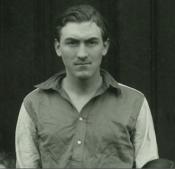
|
The King's School Canterbury |
Roll of Honour |
| 2nd Lieutenant Richard Stewart BEALE (126650) | |
|
169 Battery, 57th (King's Own Yorkshire Light Infantry) Light Anti Aircraft Regiment, Royal Artillery Date of birth: 9th June 1918 Date of death: 26th September 1940 Died of wounds aged 22 Buried Netley Military Cemetery Grave 2204 |

|
| He was born at Egerton, Kent on the 9th of June 1918 the elder son of Charles Edward Stewart Beale, Suez Canal pilot, and Daisy Mary of Ismailia in Egypt. He was educated at the Junior King's School from September 1926 and at the King's School Canterbury from January 1932 to July 1936 where he was in The Grange. He was a School Monitor and was a member of the First Cricket XI in 1935 and 1936. He was awarded his Boxing Colours in 1936. On leaving school he went on to Downing College Cambridge in October 1936 where was a member of the College Cricket XI and of the College Hockey XI in 1939. He gained a BA Honours in law in 1939, just before being called up for military service. On the outbreak of war he joined the Royal Artillery and rose to the rank of Lance Bombardier before being posted for officer training to the 133rd Officer Cadet Training Unit, Royal Artillery based at Shrivenham. He was commissioned as a 2nd Lieutenant in the Royal Artillery on the 6th of April 1940 and was posted to the 57th Anti Aircraft Regiment where he commanded a section of guns based at Woolston near Southampton, defending the Supermarine Spitfire factory. In early April 1940 the Commanding Officer of the 57th Light Anti Aircraft Regiment, Major A.W. Woodroffe, was ordered to the War Office and was asked whether he could ready his regiment for overseas service by the end of May. He replied that with their assistance he could. Help was promised and at once materialised, for within forty-eight hours twelve new subalterns arrived from Shrivenham, part of the first group turned out by 133rd Officer Cadet Training Unit which included Richard Beale. In the words of Major Woodroffe: -"What a good lot they were!" At 1.50pm on the 26th of September 1940 the Luftwaffe launched a major attack against the Supermarine works at Woolston, with a force estimated to be made up of 18 Messerschmitt Bf 110 fighter bombers with Messerschmitt 109 fighters escorting them. They attacking force hit the factory six times, causing damage to the workshops, a warehouse, a gas works and a wood yard. They also made a direct hit on a shelter containing workers from the factory and caused severe damage to the nearby village of Itchen Ferry. Although production was affected for a time while repairs were made the factory soon returned to full production. 169 Battery fired 389 rounds of anti aircraft fire during the raid and five of the battery's guns claimed to have hit enemy aircraft with one Messerschmitt Bf110 crashing into the sea and two others being hit and crash landing into the Channel. Another aircraft was damaged but managed to return to its base. Casualties were 98 dead with many more injured many of whom were skilled workers. Amongst the wounded were Richard Beale and one of his Gunners, whose battery had engaged the raiders. He died of his wounds in hospital later in the day. The Downing College magazine, "The Griffin", wrote of him: - "Never academically prominent in the College, he distinguished himself in games, being not only a hockey colour but also the mainstay of the cricket team as a fast bowler. Dick's cheerful, equable temperament and his colourful clothes might have led the casual observer to believe him easy-going, even happy-go-lucky. But no one who saw him plugging away, over after over, giving his best, no matter the state of the game, would have thought him lacking in those qualities of dash and determination which we usually call "guts" for short. His untimely death on active service will leave all his acquaintances the sadder for the loss of a most pleasant personality and a staunch friend." A King's Canterbury school friend wrote: - "All who came in contact with him were struck by his sincere honesty and kind-heartedness and will remember him for the great sportsman that he was. He leaves a family sadly depleted, and in it a position that could not be filled by a more loved brother and son." His father, Lieutenant Charles Edward Stewart Beale RNR died at Durban, South Africa on the 19th of July 1944 while serving at the Royal Naval Air Station HMS Kongoni. He is commemorated on the war memorial at Downing College, Cambridge. |
|
| The Grange |
Back